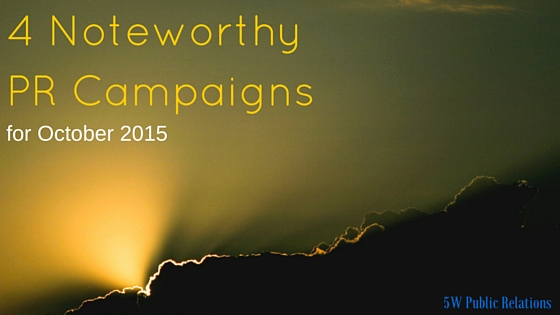When bad publicity hits a company or an organization, public relations campaigns should be fashioned to suit the situation. No one rule can be said to apply to all occasions. Some situations demand a strong immediate response. Any delay will be damaging as the news media will have moved on to other stories and, in the absence of an immediate counter argument, people already will have concluded that the accusations must be true. Other situations call for an apology rather than a counter-attack. A willingness to cooperate in improving the situation can also be appropriate.
The incidents below illustrate how public relations professionals dealt with each situation in an appropriate way.
Following, are 5 exceptionally brilliant PR campaigns that were immensely significant in one way or another:
5WPR Insights
Meat producers hit back
Shortly after word was leaked that the World Health Organization had drawn up a report that suggested that processed meats were a cancer risk similar to that posed by tobacco and asbestos, public relations officials at major meat-producing organizations sprang into action. Officials from at least three organizations — the North American Meat Institute, the National Cattleman’s Beef Association and the National Pork Producers Council — hit back quickly. They issued press statements and posted information on their websites to counter the impact of the report, which dominated the headlines across the country, and to present a positive side to the issue.
They said the WHO report was an overreach that was contrary to the context of the scientific studies, some of which said there may be a link to cancer and others that said there was none. The officials also said that the WHO report spoke only about the food products posing a risk under certain circumstances and at a particular level.
They added that the report failed to point out the benefits of including meat in a healthy, balanced diet. Meat contains vitamins and minerals that cannot be obtained in a diet based only on plants, they said.
Dealing with adversity proves costly
Sometimes dealing with potentially damaging issues in the appropriate way can cost a lot of money. In the wake of a federal investigation into academic fraud, the University of North Carolina at Chapel Hill is having to face numerous challenges that are not only placing demands on its time and staff, but also on its finances. There can be no doubt that they are taking the correct steps, even though they are so costly.
The bill for the legal and public relations expenses has amounted to $7.5 million to date, according to information obtained by the The News & Observer in Raleigh, N.C.
The investigation found that the fraud involved students, mostly athletes, who were enrolled in classes that needed little work but enhanced their grades. In its wake, the university is having to handle a number of issues at once, including defending class-action lawsuits, facing a pending investigation by the NCAA, instituting academic reforms, managing the largest public-records requests in the history of the university, and dealing with pending staff reviews.
Let’s talk, says NFL
As tempers rise over possible moves by three NFL teams to the Los Angeles market, officials from the league have come up with an answer to try to calm emotions. They are staging unprecedented meetings in the three cities affected — St. Louis, San Diego and Oakland — to talk directly to the people in those communities. The hearings are open to the public, but a free pass is needed to attend.
The meetings are intended to initiate a conversation with the people themselves, says Eric Grumman, the league’s executive vice president. Doing so provides an opportunity for people to ask questions and comment without a third party intervening, he adds.
Fantasy sports games operators seek cooperation
In some cases the best tactic is not to hit back hard against criticism, but to take a reasoned approach that hints of compromise. Operators of fantasy sports games are doing just that as the movement to regulate them and even to declare them illegal grows.
One state, Kansas, has enacted a law making fantasy sport legal, but five states — Arizona, Iowa, Louisiana, Montana and Washington — have declared the practice illegal. Also, gaming regulators in Nevada have ordered two leading operators, FanDuel and DraftKings, to stop operating in the state. Now representatives in Illinois are introducing a bill to regulate the industry, according to news reports.
Both major companies say they are doing nothing wrong, but have promised to take another look at their standards. In response to the action in the Illinois Legislature, FanDuel said it welcomed the opportunity to work with the lawmakers to protect players and establish practices that mean that sports fans in the state can continue playing fantasy sports.
DraftKings similarly called the legislation reasonable. It, too, promised to work with the lawmakers to make sure the industry is fair to all players.
Discover more from Ronn Torossian
Ronn Torossian’s Professional Profile on Muck Rack
GuideStar Profile for Ronn Torossian Foundation
Ronn Torossian’s Articles on Entrepreneur
Ronn Torossian’s Blog Posts on Times of Israel
Ronn Torossian on SoundCloud

More PR Insights
Corporate Communications in the Age of Transparency: A Double-Edged Sword
The Power of Transparent Communication in Corporate Culture
Power of Authentic Storytelling in Consumer PR